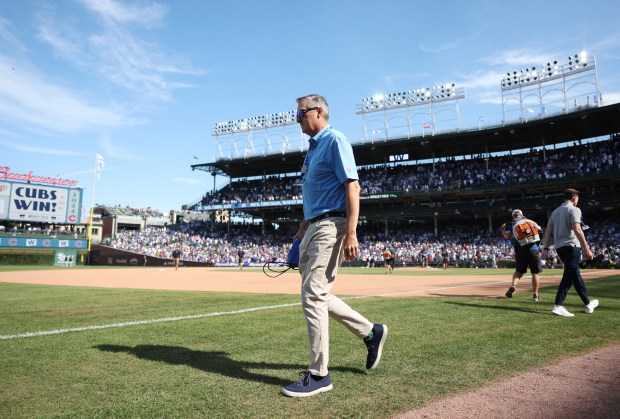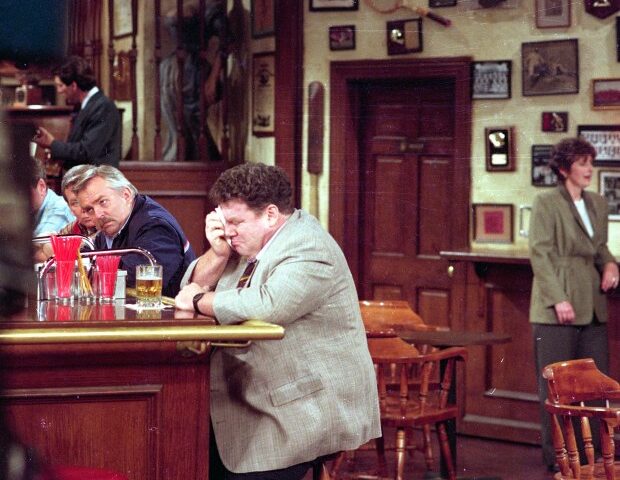For a franchise needing a superstar, a missing piece to help get it to the next level, this offseason presents an ideal situation for the Chicago Cubs.
The lineup is missing a dominant slugger who is a constant threat to get on base and change the game with one swing. Juan Soto checks every box for the type of hitter the Cubs lack, and the left-handed-hitting outfielder turned 26 last month.
Of course, that combination would prove costly to acquire. Coming off a 7.9 WAR season with the New York Yankees in which he walked more than he struck out and totaled 31 doubles and 41 home runs with a 178 OPS+, Soto could receive a deal worth more than $500 million.
Despite their big-market status and obvious need, the Cubs won’t be pursuing Soto, sources told the Tribune. Soto is expected to meet with the Yankees, Toronto Blue Jays, Boston Red Sox and New York Mets, ESPN reported last week.
Cubs Chairman Tom Ricketts told the Tribune last month that he trusts President Jed Hoyer and his baseball operations department to make the decision whether to pursue players in free agency who would require a megadeal.
“My perspective is that you get all the resources you can over to your baseball guys and let them allocate them,” Ricketts said. “Obviously, there are some players out there with 13-year contracts. We don’t have any of them at the moment, but some teams do that and some teams’ general managers think that’s a good use of resources. Some teams try to allocate their resources in a way that you get more for that and a little less exposure to long-term contracts.
“But ultimately it’s really the baseball department’s decision what they want to do with their resources.”
Jason Heyward’s eight-year, $184 million contract before the 2016 season is still the biggest free-agent deal in Cubs history and matches Alfonso Soriano’s 2006 contract for most years. But neither Heyward’s deal ($23 million annual average value) nor Dansby Swanson’s ($25.286 million AAV on his seven-year, $177 million contract) come close to the financial commitments some teams have made to superstars the previous five years.
The Philadelphia Phillies signed Bryce Harper to a 13-year, $330 million contract ($23.385 million AAV) in 2019, the same offseason the San Diego Padres acquired Manny Machado for 11 years at $350 million ($31.818 million AAV). The Mets kept Francisco Lindor with a 10-year, $341 million extension ($34.1 million AAV) in 2021.
The loaded shortstop class in 2023 included Swanson’s deal with the Cubs; Trea Turner signing with the Phillies for $300 million over 11 years ($27.273 million AAV); Xander Bogaerts signing an 11-year, $280 million contract with the Padres ($25.455 million AAV); and Carlos Correa signing with the Minnesota Twins for six years at $200 million ($33.333 million AAV).
Aaron Judge remained with the Yankees in 2022 on a then-record nine-year, $360 million contract ($40 million AAV) that was surpassed last year by the 10-year, $700 million contract the Los Angeles Dodgers gave Shohei Ohtani, with nearly all of the money being deferred.
Twenty-three contracts have been signed since 2019 with an AAV of at least $30 million. The Cubs haven’t shown an appetite to commit the number of years and dollars needed to land a top-tier star on the market.
“We talk to Tom all the time, he asks us questions and pushes us, we do research and all those different things, but ultimately those are our decisions and we own them,” Hoyer said earlier this month at the MLB general managers meetings.
“That’s the best thing you could ask for is that he respects our experience and intellect to make those decisions and he considers us the expert, so he allows us to do it. That’s the best kind of ownership.”
Unlike some owners who have shown a willingness to get involved during teams’ pursuit of marquee free agents, Ricketts said that’s not his style and he doesn’t believe it’s in the Cubs’ best interest for him to be active in player personnel.
“I honestly feel like if you get too involved, you’re probably not adding much value,” Ricketts said. “And also, if you’re making the personnel decisions and the team doesn’t do well, what happens next? There’s no accountability.
“Going all the way back to Jim (Hendry), Theo (Epstein) and Jed, I’ve always stayed out of the player decisions. Not only are they better equipped to make those decisions, it’s their reputation, it’s their careers. They want to be responsible for them and accountable for them.”
The Cubs have prioritized maintaining long-term flexibility by avoiding lengthy deals and opting for shorter, high-AAV contracts, which prevents them from engaging in the upper echelon of superstar free agents, especially hitters.
It’s an approach that has Cody Bellinger, with his $27.5 million player option he picked up, notably earning more in 2025 than the Dodgers’ Freddie Freeman ($27 million) and the Phillies’ Turner ($27,272,727) and slightly less than Harper ($27,538,462).
That’s not to say some caution isn’t warranted, as evident in what proved to be good decisions by Hoyer not to extend Kris Bryant and Javier Báez and to trade them in 2021 ahead of free agency. Bryant (seven years, $182 million) and Báez (six years, $140 million) have dealt with injuries and massive struggles after signing with the Colorado Rockies and Detroit Tigers, respectively.
If the Cubs continue to operate this way and don’t fully tap into their financial might, though, the pressure increases on the organization to develop draftees into game-changing elite talent — or to acquire it in a trade by utilizing their prospect capital. Maybe someone such as center fielder Pete Crow-Armstrong or infielder Matt Shaw will become that caliber of star.
It’s not an ideal situation, however, as the Cubs look to make their first full-season playoff appearance since 2018.




